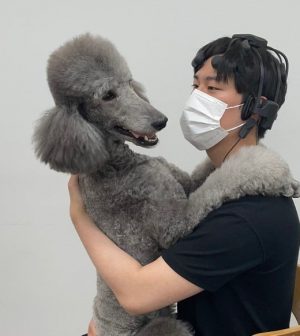- Could Your Grocery Store Meat Be Causing Recurring UTIs?
- Are You Making This Expensive Thermostat Error This Winter?
- Recognizing the Signs of Hypothyroidism
- 10 Strategies to Overcome Insomnia
- Could Artificial Sweeteners Be Aging the Brain Faster?
- Techniques for Soothing Your Nervous System
- Does the Water in Your House Smell Funny? Here’s Why
- Can a Daily Dose of Apple Cider Vinegar Actually Aid Weight Loss?
- 6 Health Beverages That Can Actually Spike Your Blood Sugar
- Treatment Options for Social Anxiety Disorder
Pooch Power: ‘Relax’ Brainwaves Begin When Folks Play With Dogs

Playing fetch or grooming Fido isn’t just good for your precious pooch — it also benefits your brain.
Such interactions appear to strengthen brain waves associated with rest and relaxation, South Korean researchers report in the March 13 issue of the journal PLOS One. Their small study compared people’s mood or hormone levels before and after spending quality time with a willing canine.
For the study, Onyoo Yoo, a doctoral student at Konkuk University in Seoul, asked 30 volunteers to take part in a series of activities with his well-trained 4-year-old female poodle. After getting to know her, the volunteers fed, massaged, groomed, photographed, hugged, walked and played with the pup.
During each activity, EEG tests measured their brain waves for three minutes. Participants also answered questions about their emotional states after each activity.
The study revealed that different activities had varying effects on participants’ brain waves.
Playing with and walking the dog increased the strength of alpha waves, a general indication of stability and relaxation, CNN reported. The study noted that alpha wave activity is linked to lower mental stress and better memory.
Meanwhile, grooming, playing and gently massaging the dog strengthened beta waves — evidence of heightened attention and concentration.
Volunteers also reported feeling less stressed, fatigued and depressed after the poodle play.
Many studies in this field have been anecdotal or subjective, according to a Canadian researcher who welcomed the insights offered by these experiments.
“It is super exciting” that Yoo’s research provides more insight into how the known benefits of human-animal interactions may be occurring, Dr. Colleen Dell told CNN. She’s a research chair in One Health & Wellness at the University of Saskatchewan.
“Studying the area in a multitude of ways — such as the EEG and subjective scales — is really important,” she said.
But a University of Michigan neurology professor said the study had some shortcomings — notably a low number of participants and the lack of a control group to see whether the actions would have similar benefits if done with a human instead of a dog.
“This study was not designed to determine what mechanisms might link pet interactions to the observed changes in brain activity,” Dr. Tiffany Braley told CNN.
Researcher Yoo conceded that further study is needed to confirm the findings. He said the results may also have been biased by the participants’ own fondness for animals because they were recruited at pet salons and a dog grooming school.
But, he concluded, one thing seems clear: “Animal-assisted therapy can be very beneficial for people who enjoy being around animals.”
More information
The National Institutes of Health has more about the health benefits of having a pet.
SOURCE: PLOS ONE, news release, March 13, 2024; CNN
Source: HealthDay
Copyright © 2026 HealthDay. All rights reserved.










